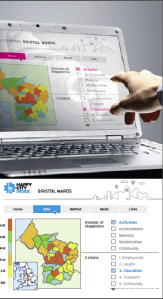Happy City Index
WHY
Local governments, cities in particular, are the coalface for wellbeing work. National policies can help (or hinder) the conditions for wellbeing, but it is local government that is in the driving seat of actions to support improvement. They can’t do this alone – all stakeholders – public, private, voluntary and individual citizens need to be enabled to improve their own wellbeing. Currently, none of these parties have the information to help them do that. The Happy City Index (and related training and engagement tools) provide it at all these levels.
WHAT
 The Happy City Index is an accessible and engaging tool that enables individuals, communities and policymakers across a city to evaluate and improve wellbeing. We have co‐created the Index with the New Economics Foundation (nef) and other local and national partners. It combines pre‐existing ward‐level data on the drivers of wellbeing (such as employment, education, health) with primary survey data on how citizens are feeling and functioning in their lives and communities. This data will shine a light on what works at all levels, for supporting what matters to peoples’ lives.
The Happy City Index is an accessible and engaging tool that enables individuals, communities and policymakers across a city to evaluate and improve wellbeing. We have co‐created the Index with the New Economics Foundation (nef) and other local and national partners. It combines pre‐existing ward‐level data on the drivers of wellbeing (such as employment, education, health) with primary survey data on how citizens are feeling and functioning in their lives and communities. This data will shine a light on what works at all levels, for supporting what matters to peoples’ lives.
The index will give much more detailed picture of wellbeing than traditional life satisfaction questions. In addition, we will engage individuals in evaluating their wellbeing over time to give us both a more ‘real time’ pulse of the city and enable people to focus and influence on what matters to them.
The latter point is key. The recent trend towards new measures of prosperity does not tend to involve the engagement of individuals and communities in the assessment and promotion of wellbeing. This scenario keeps wellbeing measurement at arms length –as something that is done to individuals and communities, rather than something that they can own and benefit from. In contrast, the Happy City Pulse is an online tool that enables individuals and communities across the city to focus on what matters most to them.
For individuals, the Happy City Pulse will be educational, engaging and productive. As they answer the simple survey questions online, they start to understand more about what influences their happiness. As they see their results in fun, visual and easy to understand ways, they start to see which aspects of their life could give the greatest boost to their wellbeing. When those results link up with information about local activities, they can discover the things within streets of their house that could enable them to improve their well–‐being. They can revisit the website over time to monitor their progress, compare how they are doing with others, and find continual inspiration for ways in which they can improve their lives.
WHO
The Happy City Index is being developed in partnership with NEF. It’s advisory board has representatives from Office for National Statistics, UNDP, NHS & Public Health, Cambridge University, UoB, UWE, Bristol City Council, and local and national businesses and community organisations. It is funded by grants from Tudor Trust, Local Enterprise Partnership, BCC and local business and individual sponsors.
We have received a great deal of interest from individual citizens, community organisations and policymakers throughout the city, who all believe this process can enable people to better assess and take control of how well their lives are going. We plan to launch the Happy City Index city wide in Bristol in 2015, with an extensive community engagement program and communications campaign.
We are currently in talks with a range of national and international bodies, interested in the potential to roll out the Index to other cities across the UK and Europe in 2016. We have interest from groups in 49 cities in 20 countries interested in using the Happy City model.

